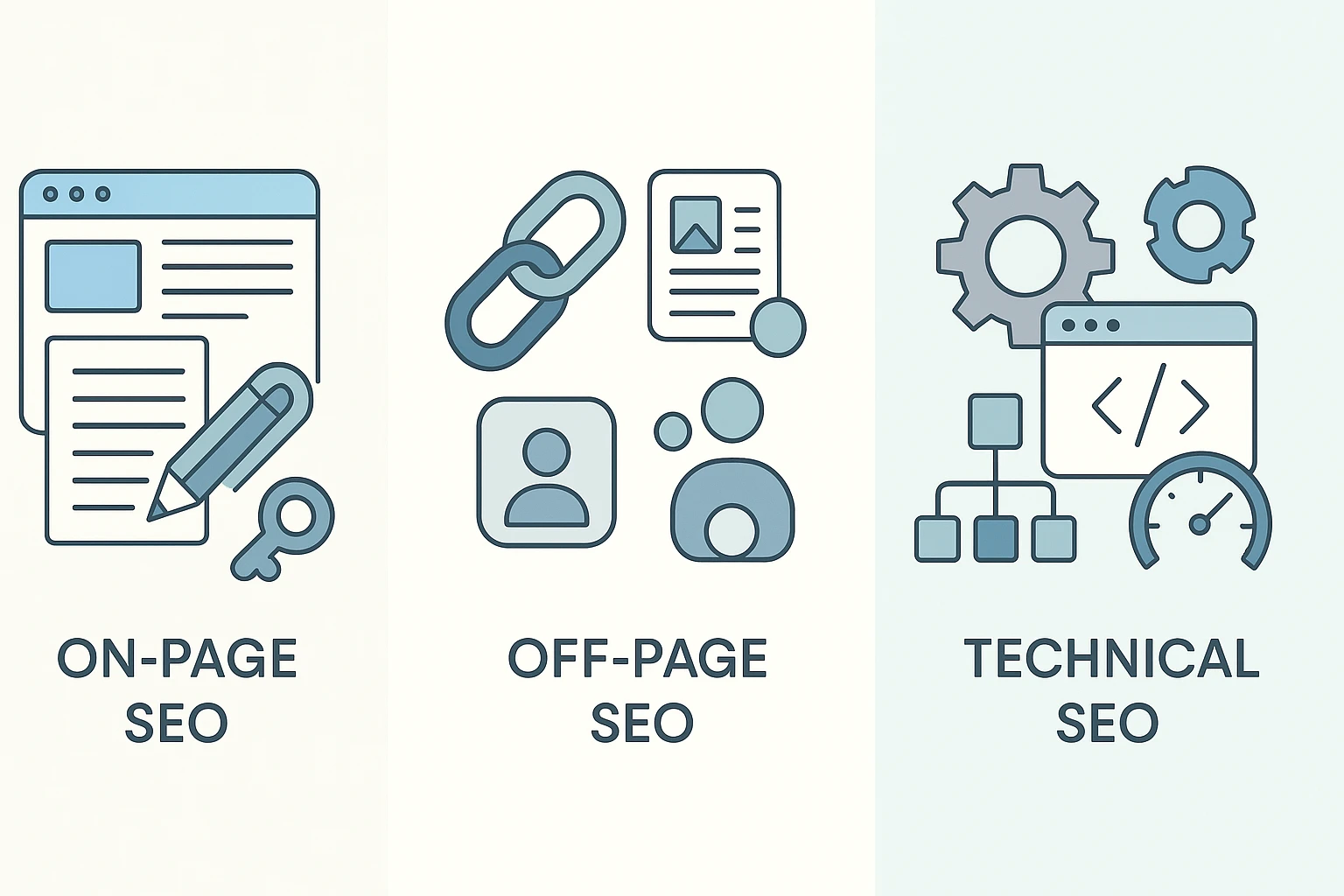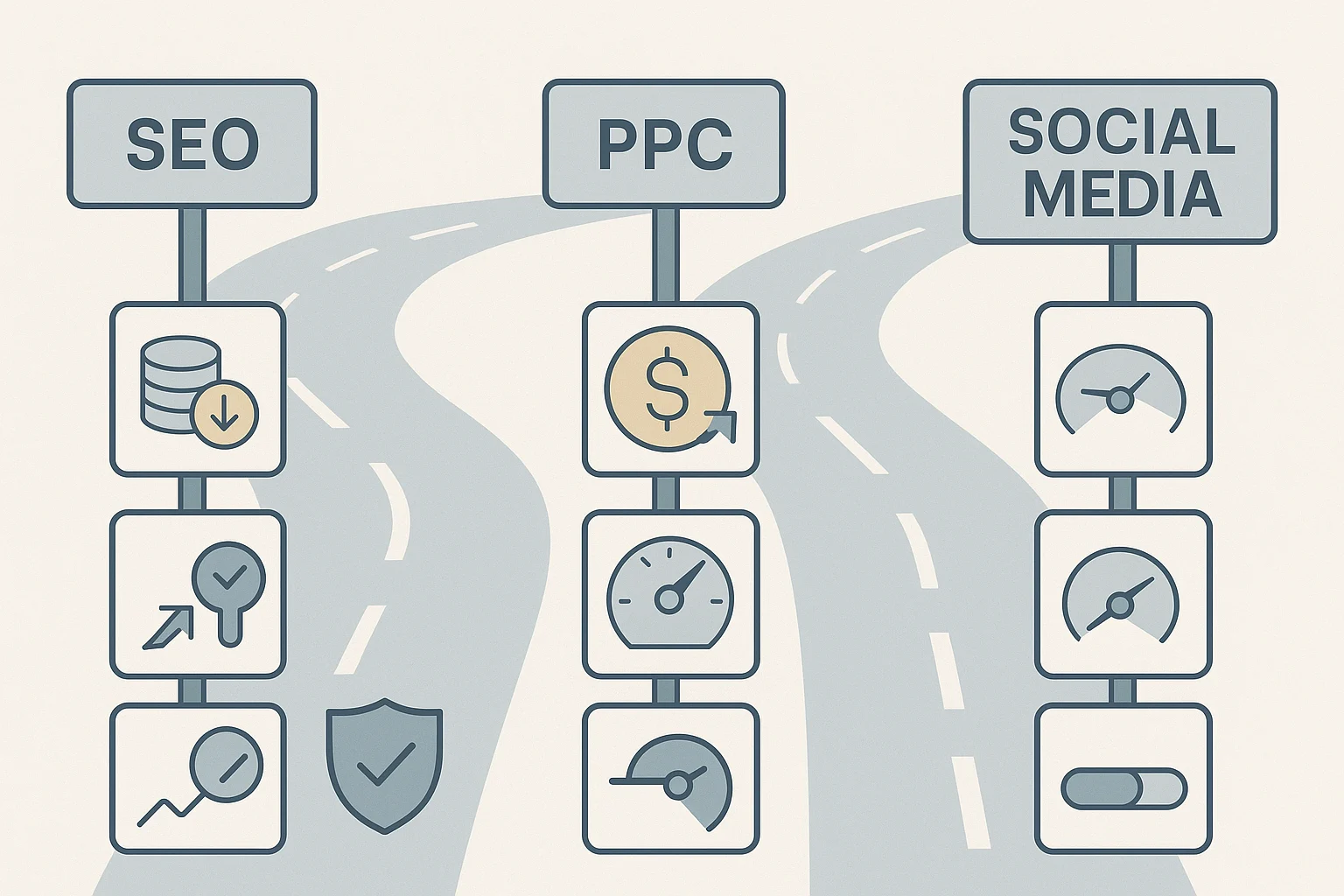In the present scenario of a highly competitive online world, simply having a website isn’t enough. To stand out, attract visitors, and convert them into customers, businesses must invest in visibility—and this is where Search Engine Optimization (SEO) plays a vital role. But what exactly is SEO, and how does it fit into the broader scope of digital marketing?
Whether you’re a student, a startup founder, or a small business owner exploring ways to grow your online presence, this guide will help you understand the role of SEO in digital marketing and why it’s one of the most powerful tools in your digital toolkit.
What Is SEO in Digital Marketing?
Search Engine Optimization (SEO) is the process of optimizing your website and its content to rank higher in search engine results (like Google or Bing) when users search for relevant terms.
In simple terms: SEO helps your content get found.
While digital marketing includes a variety of strategies—such as paid ads, social media, email marketing, and PR—SEO focuses specifically on organic visibility, aiming to attract users naturally, without paying for every click.
Why Is SEO Important in Digital Marketing?
The importance of SEO in digital marketing cannot be overstated. Here’s why:
- 93% of online experiences begin with a search engine.
- Users trust organic results more than paid ads.
- SEO drives high-intent traffic—people actively looking for solutions.
When done right, SEO doesn’t just bring visitors to your website. It brings the right kind of visitors—those most likely to engage, convert, and become loyal customers.
Types of SEO You Need to Know

To understand the full scope of SEO, it’s helpful to break it down into three core types:
1. On-Page SEO
This refers to optimizing the content and structure of your web pages. It includes:
- Using relevant keywords (like “digital marketing services” or “local SEO expert”)
- Writing high-quality, informative content
- Optimizing headers, meta descriptions, and image alt tags
- Improving user experience (mobile-friendliness, speed)
2. Off-Page SEO
This involves actions outside your website that influence your rankings:
- Link building: Earning backlinks from other reputable websites
- Guest blogging
- Social signals
- SEO link building services often help in this area
3. Technical SEO
This focuses on the backend structure of your website to ensure search engines can crawl and index it properly. It includes:
- Fixing crawl errors
- Improving page load speeds
- Technical SEO audits
- Implementing structured data and XML sitemaps
How SEO Fits into a Digital Marketing Strategy
Digital marketing is a broad strategy that includes many channels—email, PPC, social media, influencer campaigns, and more. Among these, SEO serves as the long-term, organic growth engine.
Here’s how SEO complements your digital strategy:
- Content marketing needs SEO to be discovered.
- Paid ads can be expensive; SEO provides sustainable traffic.
- Social media can drive awareness, but SEO brings people actively searching for answers.
- Email lists grow when your SEO content includes lead magnets or resources.
SEO is foundational. It ensures your digital content has a strong base of visibility, ranking well and working even while you sleep.
SEO vs. PPC and Social Media: How Does SEO Compare?

Let’s quickly compare SEO with other digital marketing channels:
Channel | Cost | Speed | Longevity | Trust |
SEO | Low (mostly time) | Slower (takes months) | Long-lasting | High |
PPC (Google Ads) | High (pay-per-click) | Immediate | Short-term | Moderate |
Social Media | Medium | Fast | Short-medium | Moderate |
While PPC and social media deliver quicker results, they stop when your budget runs out. SEO builds equity over time, generating leads even after months or years.
Benefits of Search Engine Optimization in Digital Marketing
Still wondering why SEO deserves a place in your strategy? Here are the core benefits:
- Increased Website Traffic
- SEO brings in consistent, high-quality traffic.
- SEO brings in consistent, high-quality traffic.
- Cost-Effective Growth
- Unlike paid ads, SEO offers long-term ROI with lower ongoing costs.
- Unlike paid ads, SEO offers long-term ROI with lower ongoing costs.
- Brand Credibility and Trust
- Users trust sites that rank organically.
- Users trust sites that rank organically.
- Better User Experience
- Good SEO improves site structure, load time, and navigation.
- Good SEO improves site structure, load time, and navigation.
- Local Visibility
- With local SEO services, businesses can target users in specific geographic areas.
- With local SEO services, businesses can target users in specific geographic areas.
- Data-Driven Decisions
- SEO tools give insights into user behavior and content performance.
- SEO tools give insights into user behavior and content performance.
Essential SEO Services & Tools to Support Your Strategy
If you’re just getting started, here are some services and tools that can support your SEO journey:
🔧 Services to Consider:
- SEO digital marketing agency: Full-service firms that manage SEO alongside content, ads, and branding
- Local SEO expert: Focuses on Google Maps rankings, reviews, and regional visibility
- Technical SEO audits: Checks your site for crawlability, speed, errors, and more
- SEO link building services: Builds authority with ethical, high-quality backlinks
🛠️ Tools You Might Use:
- Google Search Console
- Ahrefs or SEMrush
- Screaming Frog
- Yoast SEO (WordPress)
- Ubersuggest
💡 Wondering about the cost?
SEO services cost can vary from $200 to $5000/month depending on your needs, business size, and the agency’s expertise.
Working with an SEO or Digital Marketing Agency
Not every business has in-house SEO experts. That’s why many turn to a seo digital marketing agency for support. These agencies offer full-service solutions—content, audits, analytics, and link building—aligned with your overall digital marketing goals.
When choosing an agency:
- Ask about their past results
- Request a technical SEO audit
- Check their knowledge of local SEO services
- Understand their link-building practices (quality > quantity)
FAQs: What People Also Ask
1. What is SEO and why is it important in digital marketing?
SEO is the process of improving a website’s visibility in search engines. It’s crucial in digital marketing because it helps attract organic, high-intent visitors without relying solely on paid ads.
2. What are the 3 types of SEO?
The three main types are on-page SEO, off-page SEO, and technical SEO. Each plays a unique role in boosting rankings and traffic.
3. How does SEO differ from PPC?
SEO drives unpaid (organic) traffic over time, while PPC involves paying for ads to appear instantly in search results. SEO builds long-term value, while PPC offers immediate exposure.
4. Is SEO still effective in 2025?
Absolutely. As Google’s algorithms evolve, so does SEO. In fact, technical SEO, content quality, and user experience are now more important than ever.
Conclusion: Make SEO the Heart of Your Digital Marketing Strategy
If digital marketing is the engine that drives your online presence, then Search Engine Optimization is the fuel that keeps it running efficiently and sustainably. It brings targeted traffic, builds brand authority, and delivers long-term results that paid ads often can’t match.
Whether you choose to work with a local SEO expert, invest in technical audits, or partner with a seo digital marketing agency, understanding the role of SEO in digital marketing is the first step toward online success.
✅ Ready to optimize your digital presence?
Book a free consultation with our team at Hopestone Media—we’ll help you build a powerful SEO strategy tailored to your business goals.

